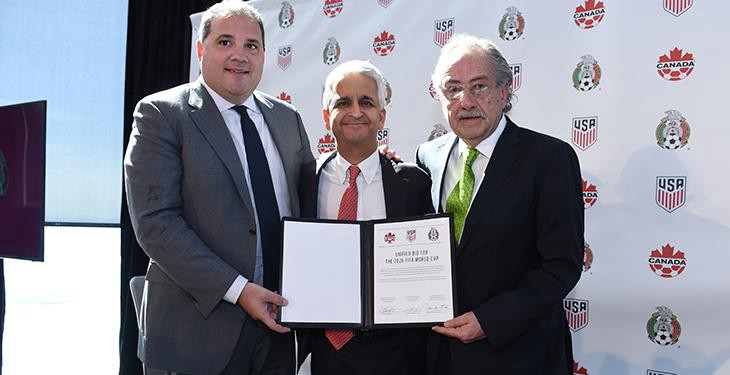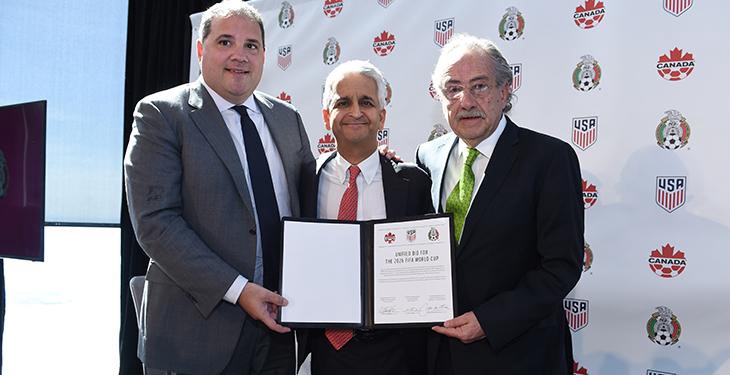The United States, Mexico, and Canada announced on Monday that they are planning to submit a bid to host the 2026 FIFA World Cup.

The United States, Mexico, and Canada announced on Monday that they are planning to submit a bid to host the 2026 FIFA World Cup. Generally, the World Cup is designated to a specific country rather than multiple. A combined bid has only been proposed once before when Japan and South Korea co-hosted in 2002.
While the designation of the World Cup to a single country has benefits including a boost to national pride and tourism to that specific region, there are also drawbacks.
These include problems with timetables and deadlines, exceeding budgets and, most of all, lack of hindsight in terms of facility use after the champion is crowned. These unused, costly facilities are called white elephants and have been particularly a problem in South Africa and Brazil, the hosts of the 2010 and 2014 World Cup, respectively. In both cases, many of the stadiums constructed for the tournament are no longer in use because of the lack of a local team nearby and the high operating cost of hosting events.
The struggles leading up to and following Brazil, in particular, make the combined CONCACAF bid even more brilliant. The new proposed bid combines the expertise and existing venues of three seasoned host countries with a realistic vision for a growing tournament. All three countries have previously hosted either a men’s or women’s World Cup. The U.S. hosted in 1994 when it set attendance records that still stand to today, Mexico held the tournament in 1970 and 1986 and Canada was the host of the 2015 women’s World Cup. The fact that any of these countries could have hosted again on their own leads to the question: why collaborate?
One reason may be tournament changes that are coming in 2026. In 2026, the World Cup will expand to feature 48 teams, as it was announced that the number participants would increase from 32 earlier this year. A multi-country bid makes sense, particularly in an expanded tournament, and is a smart business decision to allocate resources effectively and minimize residual unused infrastructure post-tournament.
Another reason is the fact that the World Cup is a global tournament and one of the most watched sporting events in the world. Cross-country cooperation promotes sport as a way to bring people together. Collaborating in this sense, as done by Japan and South Korea in 2002, is hopefully the future of international events like the World Cup.
While all countries behind the CONCACAF bid have previously hosted and, therefore, have available facilities, three-quarters of the matches will take place in the U.S. while the remaining will be divided between Canada and Mexico, according to U.S. Soccer president Sunil Gulati. This makes sense as the U.S. has an abundance of high quality stadiums that would be more than adequate to host World Cup games. This was demonstrated at the Copa America tournament this past summer, which successfully featured 16 teams and matches at 10 stadiums across the country.
Some could argue that multi-country bids will hurt national pride that comes from being a sole host of the prestigious World Cup. Yet co-hosting shares that pride between neighboring nations and broadens the accessibility of the tournament to the surrounding countries. After the tournament ends, residual effects from the build up to the World Cup are less likely to burden a host country because the responsibility is shared. Most importantly, the World Cup has always been a symbol of sport bringing people together across traditional borders, so why not allow the host committee to be a shining example of cross-cultural collaboration?
Going forward with the expanded 48-team tournament, multi-country hosts for the World Cup may become more common. For any country, the United States included, a 48-team tournament would be hard to manage alone and for some it would be nearly impossible. Joint bids share the hosting benefits while minimizing the risks, particularly from a financial and infrastructure prospective. There are signs that this trend may continue. There is already talk of a joint Uruguay-Argentina bid for the 2030 World Cup as a celebration of the 100-year anniversary of the first tournament, which took place in Uruguay in 1930.
This, combined with the strong early momentum of the CONCACAF bid, all point in the direction that the days of single country hosts may be coming to a close.
Front Office Sports is a leading multi-platform publication and industry resource that covers the intersection of business and sports.
Want us to learn more, or have a story featured about you or your organization? Contact us today.

















